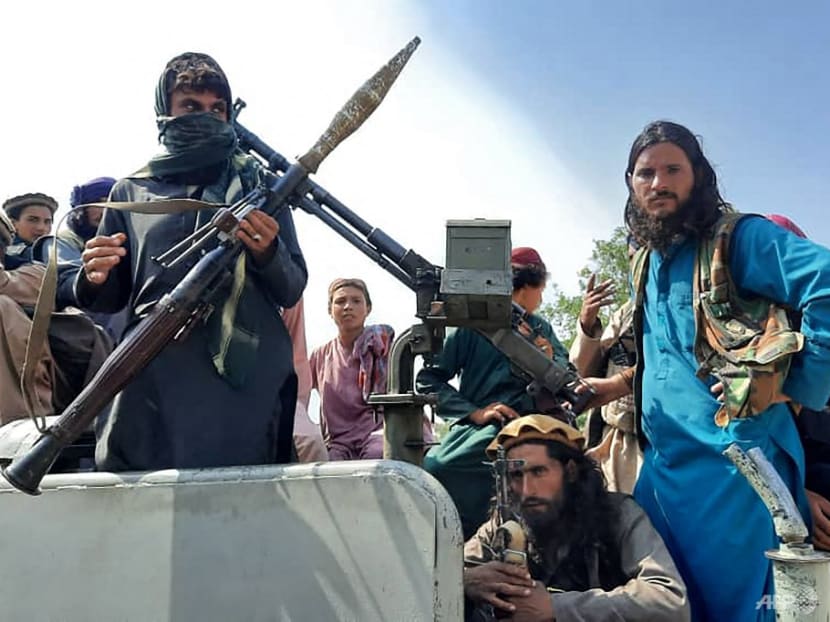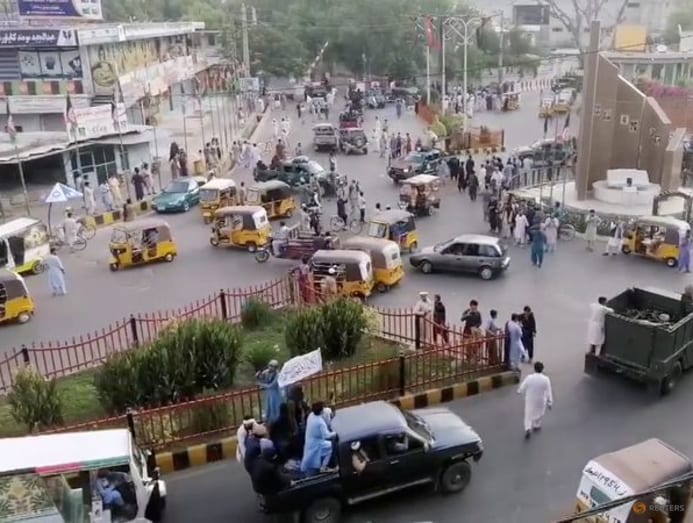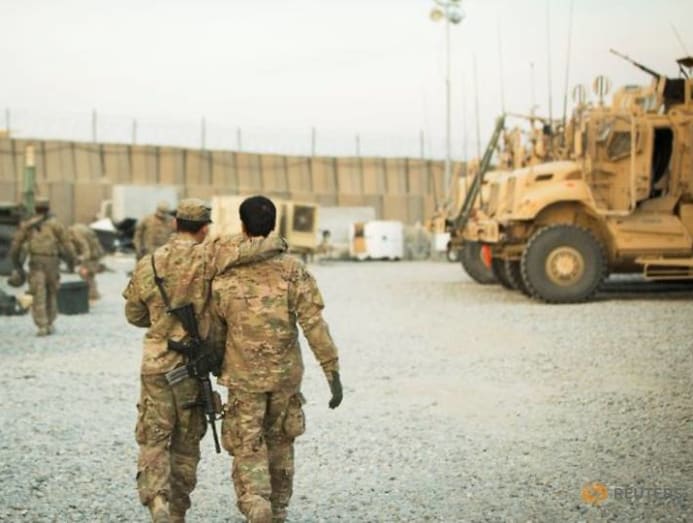Commentary: Why Taliban victory was inevitable despite trillions poured in by the US
Ad
Commentary
Commentary: Why Taliban victory was inevitable despite trillions poured in by the Usa
While many may criticise Biden for pulling The states forces out, it was unlikely the US could achieve stability in Transitional islamic state of afghanistan, says a government studies professor.

Taliban fighters sit over a vehicle on a street in Laghman province on Aug 15, 2021. (Photo: AFP)
sixteen Aug 2022 03:49PM (Updated: 16 Aug 2022 03:49PM)
COLCHESTER, England: In less than a week, the Taliban has captured nearly a dozen key cities in Afghanistan. With the departure of US forces, it has taken over the country from the embattled Afghan government.
Over the past 20 years, the The states has poured trillions of dollars into Afghanistan to oust the Taliban, an attempt that was clearly unsuccessful. Merely a look at the country's strategic geographic location and the politics of the region (including support for the Taliban) tells united states of america that this effect was inevitable.
Afghanistan is strategically located betwixt Primal and South Asia – a region rich in oil and natural gas. Information technology has as well struggled with efforts by different Afghanistan-based ethnic groups to create ancestral homelands. The Pashtun population (and to a lesser extent the Baluch population) are particularly implicated in this.
For these and other reasons, Afghanistan has long faced constant meddling from the Soviet Union/Russia, United kingdom, the The states, Islamic republic of iran, Saudi arabia, India and of class, Pakistan.
Islamic republic of pakistan'S DOUBLE-EDGED Support FOR TALIBAN
Afghanistan's relationship with Pakistan has been fraught with tension ever since the former was recognised as a sovereign state in 1919.
When Pakistan gained its independence in 1947, Afghanistan was the sole country to vote against its formation in the United Nations.
Some of the tension emanated from Afghanistan's refusal to recognise the Durand Line – the hastily drawn 1,600-mile (ii,600km) border that cutting across thousands of Pashtun tribes in 1893.

Fearing calls from Pashtuns in both countries to create a national homeland that would cut through North Pakistan, Islamic republic of pakistan has long sought to turn Afghanistan into an client state – supporting an Islamic identity (over a Pashtun ane) in Afghanistan to proceeds strategic depth confronting India.
Pakistan helped to empower the Taliban in 1994 and has been Afghanistan's most involved neighbour. Through its top intelligence agency the ISI, it has bankrolled Taliban operations, recruited manpower to serve in Taliban armies and helped to plan and arm offensives.
It has also occasionally been involved in straight gainsay support.
The ISI's support for the Taliban was rooted in its aim to erase Pashtun nationalism. But in doing then information technology may accept created a bigger problem for Pakistan, as Taliban rule has led to an exodus of Afghan citizens into Pakistan.
Nevertheless, according to the Afghan government, there are elements within Islamic republic of pakistan's government, namely the ISI, that nevertheless support the Taliban, and ongoing instability in Transitional islamic state of afghanistan.
Furthermore, Islamic republic of pakistan does non have a practiced human relationship with other groups in Afghanistan, so it has lilliputian selection only to support the Taliban.
For Islamic republic of pakistan'south government, a worst-case scenario is a protracted conflict, which could lead to another large spill-over of refugees into Islamic republic of pakistan.
WHERE Iran, Russian federation AND Cathay STAND
Islamic republic of iran's relationship with Afghanistan, which borders it to the eastward, is as well complicated by regional dynamics and its relationship with the United states.
As a Shia country, Iran has had long ideological differences with the Taliban. In the 1990s, it sought to make alliances, including with the US, to counter the threat from the Taliban.
But 2 decades later, US relations with Iran are at an all-time low, affecting Iran's opinion on how to bargain with the Taliban.
Iran has generally been hedging its bets – supporting both the Afghan government and the Taliban to keep them divided. And improved relations with Qatar – home to the Taliban'southward political part – have also helped Islamic republic of iran's human relationship with the Taliban.
Russia is generally concerned with preventing instability at its border with Transitional islamic state of afghanistan, and with keeping Afghanistan complimentary of US influence.

Since the 1990s Moscow has been developing relations with different groups in Afghanistan, including the Taliban, despite misgivings virtually the Taliban's possible support for terror groups.
These relations intensified after the emergence of Islamic State in 2015. In the fight to defeat IS in Afghanistan, Russian federation saw the Taliban'south interests coincide with its own.
Reports surfaced that Russian federation was arming the Afghan Taliban and direct undermining Usa efforts in that location, even paying bounties to impale United states and allied soldiers, even though US intelligence has expressed low confidence in these bounty claims.
China, meanwhile, has always maintained cordial relations with the Taliban. People's republic of china'south main concern is with extending its influence westward to gain strategic depth against India and the US.
CONSEQUENCES OF A TALIBAN VICTORY
For the moment, the rise of the Taliban has non translated into a rise in terrorist activity from groups like al-Qaeda against Afghanistan's neighbours – a business organization of the United states of america pulling out of the region.
Sensing the inevitability of the Taliban's rise, opportunistic alliances have formed with almost all of Afghanistan's neighbours with the Taliban, except for Bharat.
India has been mostly reluctant to engage with the Taliban, merely recently initiated contact, supported by Qatar.
Currently, the beleaguered Afghan government had earlier claimed that its neighbours were being too sanguine near the Taliban, its power to reform and whether it will aid Afghanistan attain stability.
Senior Afghan officials had warned that a Taliban victory will result in a consolidation of ability of various terrorist groups if the Taliban allows them to set upwardly a base to launch attacks.
More than important than the Taliban'south hospitality is its willingness to allow terror groups to engage freely in organised criminal offense – Afghanistan is an bonny location for this too.
The Taliban'southward resurgence has created an astute humanitarian crisis in Afghanistan alongside terrible human being rights abuses. Amidst the chaos, the prime number minister of Islamic republic of pakistan, Imran Khan, has accused the US of leaving behind a "mess".
And notwithstanding, while many may criticise US President Joe Biden for pulling forces out, there is little likelihood, given all these regional forces at work, that the United states could ever have achieved stability in Afghanistan – no matter how long it stayed.
Natasha Lindstaedt is Professor, Department of Government at University of Essex. This commentary first appeared on The Conversation.
Recent Searches
Trending Topics
Source: https://cnalifestyle.channelnewsasia.com/commentary/afghanistan-taliban-kabul-pakistan-role-victor-275906

0 Response to "Commentary: Why Taliban victory was inevitable despite trillions poured in by the US"
Post a Comment